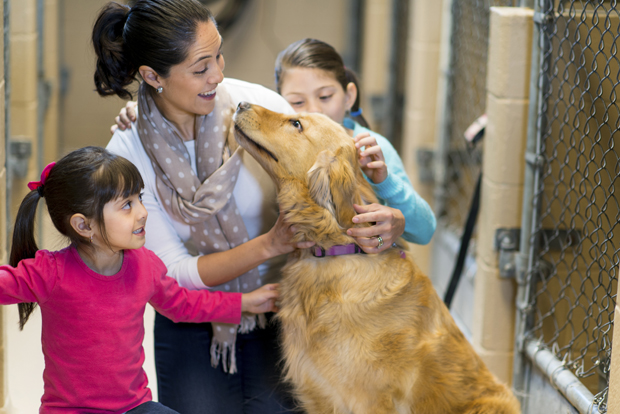
By Lauren Malmberg, Peoria County Animal Protection Services
So, you’ve decided it’s time to get a new animal friend. Where do you
go? Consider visiting the local animal shelter. Millions of dogs and
cats enter animal shelters each year in the U.S. It seems that this
should be a perfect match; family looking for a pet, homeless animal
looking for a home. But nationally only about 20 percent of new pets
come from shelters; the other families get their pets from breeders, pet
shops, neighbors, newspaper ads, and internet sites. Actually, the best
choice for a new pet can be your local animal shelter rather than some
of these other options.
Selection
Most animal shelters have a wide variety of animals of different sizes,
breeds, and age. Visiting a shelter allows potential owners the ability
to consider the different options. Do you want a couch potato or a dog
to take jogging? Do you want a cat who lies on your lap or one that’s
more aloof? You’ll find all types of personalities at the shelter.
Shelters usually have animals of all ages as well. You can choose a pet
that fits your current lifestyle.
As for breeds, national intake numbers estimate that nearly 40 percent
of dogs entering shelters are identifiable purebred animals. You can
also check out breed rescue groups who re-home purebreds, so you don’t
necessarily need to patronize a breeder or pet shop to get exactly the
breed you want.
Evaluation
Nearly every shelter evaluates animals for temperament before placing
them up for adoption. Nobody wants to place an aggressive pet — those
animals should be prevented from re-entering the community where they
may cause problems. So shelter workers usually use one of the
nationally-recognized models to evaluate the dogs and cats to determine
their suitability for adoption.
Dogs, in particular, are screened for aggression toward people, toward
other animals, and around food or other resources. In addition, new pet
owners may learn of an animal’s personality and behaviors — housebroken,
walks well on leash, likes to play ball, knows commands, and more —
from staff and volunteers. Although cats can be somewhat harder to
assess for behavior, shelters often have information from previous
owners about their personality traits.
Health
Shelters generally assess animals for any health concerns before putting
the animals up for adoption. Dogs and cats usually receive initial
vaccinations against upper respiratory infections; dogs nearly always
receive inoculations against parvo virus. Pets get checked for parasites
and receive de-wormer if needed. Many shelters also test for heartworm
in dogs and feline leukemia and FIP in cats.
In Illinois, dogs and cats must be spayed or neutered if adopted from a
shelter; the sterilization generally takes place before the animal goes
home, and the cost is included in the adoption fee. State law also
requires that adopted animals get a microchip; this, too, is included in
the fee.
Essentially, an animal adopted from a shelter comes with its initial
vaccinations, has been de-wormed, has been spayed or neutered and
microchipped, and is all set to go! If you’re getting an animal from
another source, most likely all of these procedures will be an
additional cost to you.
Saving a Life
When you adopt from an animal shelter, you’re saving a life. Animals
left at shelters usually are young, healthy, and friendly pets that
simply were no longer wanted by their owners. By adopting one, you’ve
prevented it from being euthanized and freed space for another animal in
need of the shelter’s care. If you buy a pet from a breeder or pet
store, you’re simply increasing the demand for their animals,
encouraging the continued breeding, and selling of dogs and cats. Even
getting a pet from a neighbor or through the paper simply encourages
those people to not spay or neuter their animals.
Shelters in Illinois must disclose what they know about an animal
they’re putting up for adoption; this can be a protection against
placing an animal with serious health or behavior issues. Unfortunately,
the general public and even breeders are not held to this standard.
Shelters must abide by state laws governing the health care and adoption
of the animals they handle — doing otherwise puts their licenses in
jeopardy. Adopters can be assured that a shelter has, at the very least,
relayed important background information to them prior to adoption and
have provided some health care.
When you’re ready for your new pet, check out your local animal shelter or rescue group. You may find the best new friend ever!
For more information, call Peoria County Animal Protection Services
at 309-672-2440. Looking to find a furry companion? Think Adoption! An
animal is waiting to be your “fur-ever” pet! Visit our adoptable animals
today!
Photo credit: CEFutcher/iStock
